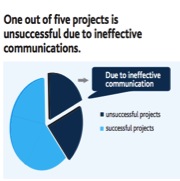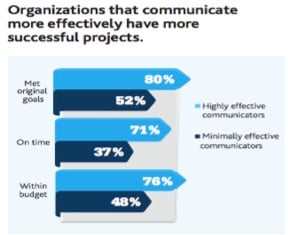Measuring in-progress project performance is important so that potential problems can be identified as early as possible and so that stakeholders are made aware of progress. It is often a challenge to identify appropriate key performance indicators that actually measure what we really want to evaluate in regards to performance. Most people recommend choosing two to five KPI’s to properly gauge performance and to keep a high level view. It is important to remember that KPI’s are readings that enable stakeholders to assess how well the project is progressing in general against the stated objectives. It is often hard to measure the success of the project until long after the project has been completed.
Tracking the schedule and budget are critical KPI’s. However, it is important that these two are tracked together due to their tradeoff nature. Tracking discrepancies here allows the project manager to identify issues and drill down to resolve them quickly. More specific KPI’s, such as the number of scope changes and defects discovered during the project, can provide insight into the root causes of schedule and budget issues.
Another KPI to measure is the completion of quality deliverables. In order to effectively measure these, it is important that there is effective planning that clearly identifies critical tasks that need completed and what the specific requirements of each task are. Once these are identified and agreed upon, the project manager can track performance against these planned deliverables. These deliverables serve to link the required tasks to the schedule and give stakeholders an excellent pulse on project success.
The effort being expended by company resources is another important indicator. This can be very difficult to track and requires a disciplined approach. There are many types of technology that can assist with the tracking and reporting of time spent on a project by internal resources. Having this data can allow the project manager to track schedule compliance and better estimate completion dates. My company uses a software platform called Planview for all R&D projects.
Lastly, stakeholder satisfaction can be measured to assess how happy clients and team members are with the way in which the project is being managed and progressing. This data can speak to the responsiveness of the project team, the level of communication, the level of involvement, and the general feeling about the progress.
Combining these KPI’s and reporting them to stakeholders allows project managers to identify issues and deal with them proactively. Reporting these also allows the project manager to set expectations to stakeholders regarding the success of the project. What types of KPI’s have others used to track and report project performance?
Source: Pitagorsky, G. “Measuring In-Progress Project Performance.” Project Management Times. Project Management Times, 30 Jan. 2013. Web. 18 Jul. 2015.

